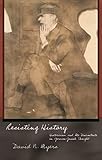Resisting History : Historicism and Its Discontents in German-Jewish Thought / David N. Myers.
Material type: TextSeries: Jews, Christians, and Muslims from the Ancient to the Modern World ; 36Publisher: Princeton, NJ : Princeton University Press, [2022]Copyright date: ©2003Description: 1 online resource (269 p.) : 5 halftonesContent type:
TextSeries: Jews, Christians, and Muslims from the Ancient to the Modern World ; 36Publisher: Princeton, NJ : Princeton University Press, [2022]Copyright date: ©2003Description: 1 online resource (269 p.) : 5 halftonesContent type: - 9781400832569
- Historicism -- History
- Jewish learning and scholarship -- Germany -- History -- 19th century
- Jewish learning and scholarship -- Germany -- History -- 20th century
- Judaism -- Historiography
- HISTORY / Europe / Germany
- Agudat Yisrael
- Balfour Declaration
- Benjamin, Walter
- Breuer, Salomon
- Cassirer, Ernst
- Conservative Revolution
- Davos conference
- Denominationalism
- Dilthey, Wilhelm
- Ehrenfreund, Jacques
- Enlightenment
- Erets Yisrael
- Fischer, Kuno
- Frankfurt am Main
- Funkenstein, Amos
- Geiger, Abraham
- Geisteswissenschaft
- Guttmann, Julius
- Hegelianism
- Heidegger, Martin
- Jewish nation
- Jewishness
- Kassel
- Kellerman, Benzion
- Kierkegaard, Søren
- Kulturprotestantismus
- Lazarus, Moritz
- Luther, Martin
- Marr, Wilhelm
- Meinecke, Friedrich
- Naturwissenschaft
- Neue Kusari
- Nordau, Max
- Otto, Rudolf
- Rabbinic Judaism
- Revelation
- Rosenheim, Jacob
- Scholem, Gershom
- Uganda proposal
- anti-historicism
- assimilation
- biblical prophets
- communitarianism
- conversion to Christianity
- cultural bifocality
- ecclesiastical history
- historical Jesus movement
- historicism
- philosophy
- positivism
- post-structuralism
- systematic theology
- BM195
- online - DeGruyter
| Item type | Current library | Call number | URL | Status | Notes | Barcode | |
|---|---|---|---|---|---|---|---|
 eBook
eBook
|
Biblioteca "Angelicum" Pont. Univ. S.Tommaso d'Aquino Nuvola online | online - DeGruyter (Browse shelf(Opens below)) | Online access | Not for loan (Accesso limitato) | Accesso per gli utenti autorizzati / Access for authorized users | (dgr)9781400832569 |
Frontmatter -- CONTENTS -- ACKNOWLEDGMENTS -- A NOTE ON THE COVER -- INTRODUCTION -- CHAPTER ONE Jewish Historicism and Its Discontents: An Introduction -- CHAPTER TWO Hermann Cohen and the Problem of History at the Fin de Siècle -- CHAPTER THREE Franz Rosenzweig and the Rise of Theological Anti-Historicism -- CHAPTER FOUR Anti-Historicism and the Theological-Political Predicament in Weimar Germany: The Case of Leo Strauss -- CHAPTER FIVE Isaac Breuer and the Jewish Path to Metageschichte -- CHAPTER SIX From Conclusion to Opening: A Word on Influence, German Jews, and the Cultural History of Ideas -- NOTES -- BIBLIOGRAPHY -- INDEX
restricted access online access with authorization star
http://purl.org/coar/access_right/c_16ec
Nineteenth-century European thought, especially in Germany, was increasingly dominated by a new historicist impulse to situate every event, person, or text in its particular context. At odds with the transcendent claims of philosophy and--more significantly--theology, historicism came to be attacked by its critics for reducing human experience to a series of disconnected moments, each of which was the product of decidedly mundane, rather than sacred, origins. By the late nineteenth century and into the Weimar period, historicism was seen by many as a grinding force that corroded social values and was emblematic of modern society's gravest ills. Resisting History examines the backlash against historicism, focusing on four major Jewish thinkers. David Myers situates these thinkers in proximity to leading Protestant thinkers of the time, but argues that German Jews and Christians shared a complex cultural and discursive world best understood in terms of exchange and adaptation rather than influence.After examining the growing dominance of the new historicist thinking in the nineteenth century, the book analyzes the critical responses of Hermann Cohen, Franz Rosenzweig, Leo Strauss, and Isaac Breuer. For this fascinating and diverse quartet of thinkers, historicism posed a stark challenge to the ongoing vitality of Judaism in the modern world. And yet, as they set out to dilute or eliminate its destructive tendencies, these thinkers often made recourse to the very tools and methods of historicism. In doing so, they demonstrated the utter inescapability of historicism in modern culture, whether approached from a Christian or Jewish perspective.
Mode of access: Internet via World Wide Web.
In English.
Description based on online resource; title from PDF title page (publisher's Web site, viewed 29. Jun 2022)


